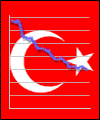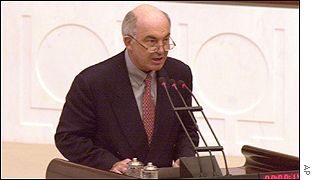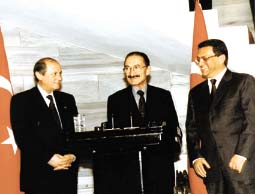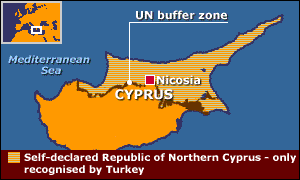4
July 2002
![]()
2. "Turkey's Dervis concerned persistent instability may continue", Turkish Economy Minister Kemal Dervis is concerned the instability fuelled by the ill health of Prime Minister Bulent Ecevit and a government rift over democratic reforms may persist, mass-circulation Milliyet reported on Thursday.
3. "Turkish early elections ruled out", coalition partners in Turkey’s government have agreed elections should be held in 2004 as scheduled rather than be brought forward, ailing Turkish Prime Minister Bulent Ecevit said on Monday.
4. "Cyprus reunification talks deadlocked, target date expires", the latest round of talks aimed at reuniting Cyprus ended without breakthrough Tuesday, missing the target date set earlier for the UN-sponsored negotiations to be finished by the end of June.
5. "EU says Cyprus deadlock will not derail expansion plans", the stalemate in talks on the reunification of Cyprus won't hold back the European Union's plans to take in the island among up to 10 new members by 2004, the EU said Thursday.
6. "3000 US troops on Iraqi Turkish
border", Iranian Daily Aftabi Yezd claimed that the United
States had placed 3,000 troops on the Turkish-Iraqi border for a probable
Iraqi operation.
1. -Reuters - "Ailing PM Ecevit faces battle to reassert himself":
Prime Minister Bulent Ecevit's poor health and divisions in a three-party government over reforms to open the way for European Union membership talks have raised expectations of polls next year, even late this year.
The coalition partners are united on one question -- they do not want elections now. Opinion polls show none of them would reach the 10 percent required to win seats in parliament so self-interest is likely to delay polls at least until next year.
ANKARA / 4 July 2002 / by Claudia Parsons 
Stubbornly resisting calls for him to quit, ailing Prime Minister
Bulent Ecevit must spend the summer reasserting his authority and building
consensus on Turkey's bid for EU membership, analysts said.
The 77-year-old Ecevit -- who has been in hospital twice in the last two months with ailments ranging from blood clots to a spinal problem -- insists his government will last its full term until April 2004, but talk of elections won't go away.
"It's going to be a tense summer," said Sami Kohen, a political columnist at Milliyet newspaper.
Ecevit's poor health and divisions in a three-party government over reforms to open the way for European Union membership talks have raised expectations of polls next year, even late this year.
"We've seen very clear signals from the government and coalition leaders that they want to convince the market there will be no early elections and no change of leadership," said Marco Annunziata, an economist at Deutsche Bank in London.
"As of now the market has not accepted this," he said.
Ecevit added to the uncertainty by saying elections were "on the horizon" and urging party deputies to spend the summer with the people. He later denied he meant to say polls would be before 2004.
The prime minister has yet to fully resume his duties, but attended some meetings since late last week when parliament went into recess.
Race against time 
Interest rates on government debt have soared from around 50 percent
before his illness to over 70 percent, raising the cost of servicing
a crisis-swollen debt load -- the biggest challenge under a $16 billion
IMF-backed recovery plan. All this just as inflation had begun to fall
and signs of growth were returning.
"It's a race against time," Annunziata said. "Turkey still has a comfortable period over the summer, two or three months, to bring interest rates down....
"But over the course of the summer we do need to see interest rates come down and that will depend on convincing the markets (that Ecevit is well enough to continue)."
Ecevit seems determined to cling to power and has made no moves to appoint a successor. If his health were to worsen, however, the government would look very shaky.
Kohen said Ecevit would be better advised to name a successor soon and ensure a smooth transition.
"When you have a prime minister who is sick and when you have such differences between the coalition partners, what kind of stability are you talking about?" Kohen said.
The coalition partners are united on one question -- they do not want elections now. Opinion polls show none of them would reach the 10 percent required to win seats in parliament so self-interest is likely to delay polls at least until next year.
A key task in the meantime is to tackle reforms to prepare Turkey for a possible place in the EU, including lifting the death penalty and easing restrictions on broadcasting and education in Kurdish.
Many in Turkey, which wants a date to be set for the start of its membership negotiations at an EU summit in December, have been focusing on these as the key.
But EU diplomats warn that those reforms alone will not be enough to meet strict criteria on democracy and human rights.
More to be done 
"...There still needs to be more progress on freedom of expression,
freedom of assembly, complete elimination of torture and maltreatment,
and more steps in the direction of civilian control over the military,"
said Danish ambassador Christian Hoppe, whose country has just taken
over the six-month EU presidency.
The coalition Nationalist Action Party (MHP) opposes eliminating the death penalty and easing restrictions on Kurdish language.
Ecevit's Democratic Left Party will talk through the summer with opposition parties to build support. MHP chief Devlet Bahceli says he will not cause a crisis if the DSP allies with opposition parties in parliament over reforms, but another top MHP official said this would spell the end of the coalition.
Parliament's summer recess normally lasts until the start of October but the assembly could be recalled early to pass the reforms.
Even then, Turkey's EU ambitions could be knocked sideways by a curve ball in the form of German elections in September. The conservative candidate for chancellor, Edmund Stoiber, has said Turkey should never be let in.
That may raise even more obstacles on Turkey's path which already resembles a minefield, not least because of the impending EU accession of the divided island of Cyprus.
Turkey, which seized the northern part of the island in
1974 after a brief Greek-inspired coup, has warned it could annex the
breakaway territory if enlargement includes Cyprus. Greece, which is
a member of the EU, says it will use its veto powers to block any enlargement
that does not include the island. ![]()
2. - AFP - "Turkey's Dervis concerned persistent instability may continue":
ANKARA / 4 July 2002
Turkish Economy Minister Kemal Dervis is concerned the instability
fuelled by the ill health of Prime Minister Bulent Ecevit and a government
rift over democratic reforms may persist, mass-circulation Milliyet
reported on Thursday.
"The continuation of the atmosphere of instability would be the highest burden we would have to pay," the daily quoted the minister as saying. Dervis said Turkey should go ahead with the democratic reforms that the European Union is demanding before it will consider opening membership negotiations with Ankara. The minister said if Turkey suceeded in obtaining a date for starting membership talks by the end of this year, this could have "very favourable" consequences for the crisi-hit economy.
The absence of the ailing 77-year-old Ecevit from his desk for the last two months has caused the volatile financial markets to plunge. They have been further undermined by the deepening rift in the three-way governing coalition over the key reforms -- the abolition of death penalty and cultural rights for the Kurdish minority, including the right to education in the Kurdish language.
Investors fear that Ecevit's failing health may trigger
the collapse of the government, in power since 1999, and provoke a deep
political crisis that could lead to the scrapping of economic reforms
undertaken with the support of International Monetary Fund (IMF) loans
worth 16 billion dollars. Ecevit is expected on Thursday to hold a crucial
meeting with Dervis, other top economy officials and his coalition partners
to discuss the economic situation and try to calm the volatile markets.
![]()
3. - CNN News - "Turkish early elections ruled out":
ANKARA / 3 July 2002
Coalition partners in Turkey’s government have agreed elections
should be held in 2004 as scheduled rather than be brought forward,
ailing Turkish Prime Minister Bulent Ecevit said on Monday.
Ecevit, 77, holds together the three-party coalition but has been suffering from long-standing neurological ailments and a broken rib.
He caused a mild panic in the Turkish financial community on Friday by saying that early elections were on the horizon. His office later retracted the statement.
Turkey is just beginning to recover from its biggest financial collapse in 50 years. Early elections could threaten political chaos on top of its economic problems.
"The government emphasized that it absolutely does not want early elections," Ecevit told reporters after meeting with the leaders of the other two coalition parties Monday.
He also indicated that the meeting had managed to hold at bay threats by a key coalition member, the Nationalist Action Party, to quit the government over plans to ease a ban on Kurdish language education to comply with requirements to join the European Union.
Ecevit said the government is committed to working toward implementing the EU reforms.
The EU Commission has said it will not give Turkey a date for starting negotiations on its candidacy until it implements key reforms, including abolishing the death penalty and improving the rights of its Kurdish minority.
Ecevit stumbled verbally several times during his brief
statements outside the Turkish prime ministry but otherwise looked better
than he has in previous appearances after his release from hospital.
![]()
4. - Reuters - "Cyprus reunification talks deadlocked, target date expires":
NICOSIA / 4 July 2002 / by Alex Efty
The latest round of talks aimed at reuniting Cyprus ended without
breakthrough Tuesday, missing the target date set earlier for the UN-sponsored
negotiations to be finished by the end of June.
Greek Cypriot leader Glafcos Clerides and Turkish Cypriot leader Rauf Denktas on Tuesday agreed to open what would be a fifth round of talks on July 16 aimed at reuniting the war-divided island.
"We are facing a conundrum and I have to discuss this with the (United Nations) secretary-general," Alvaro de Soto, the world body's envoy to the talks, told reporters.
De Soto said he will fly to Vienna on Wednesday to brief Kofi Annan on the lack of progress.
Cyprus has been split into a Greek Cypriot-controlled south and the Turkish-occupied north since 1974 in the wake of an abortive coup by supporters of union with Greece.
The latest talks began in December, with the island's leaders expressing hope of reaching a settlement by late June.
"There is not going to be this breakthrough we had hoped for," de Soto said.
The deadlock is being caused primarily by Denktas's insistence for recognition of his breakaway state.
The Turkish side also rejects Security Council resolutions calling for the island's reunification as a single state with two federal regions, the withdrawal of Turkish troops and 100,000 Turkish mainland settlers, and the return of 180,000 Greek Cypriot refugees.
Ankara wants reunification based on a confederation of two sovereign states linked by a central government.
De Soto said Cyprus' accession to the European Union, expected by late 2003, "is a pressing factor" that should be considered.
The problem has taken on an extra urgency following Turkish
threats to annex the north if Cyprus joins the EU before reunification.
![]()
5. - AP - "EU says Cyprus deadlock will not derail expansion plans":
BRUSSELS / 4 July 2002
The stalemate in talks on the reunification of Cyprus won't hold
back the European Union's plans to take in the island among up to 10
new members by 2004, the EU said Thursday.
"The issue of Cyprus and what you call the deadlock will in no way derail the enlargement process," EU spokesman Jean-Christophe Filori told reporters.
The EU wants to see the island reunited before it joins the Union, but if no solution is found, it plans to take in the southern part under the Greek-Cypriot administration.
The latest round of U.N.-sponsored talks ended without breakthrough Tuesday after missing a June 30 target date.
Greek Cypriot leader Glafcos Clerides and Turkish Cypriot leader Rauf Denktas agreed to open another round July 16.
EU Commission President Romano Prodi is scheduled to discuss the Cyprus question with Turkish leaders when he visits Ankara July 18-19.
Danish Prime Minister Anders Fogh Rasmussen, who took over the EU's rotating presidency on July 1, urged both sides to find a solution but underlined the bloc's determination to push ahead with its expansion plan.
"It would be an advantage to have a resolution to the Cyprus question," he told reporters at the European Parliament in Strasbourg, France. "On the other hand we don't want to create any more preconditions to enlargement."
Cyprus is one of the frontrunners to join the EU along
with Malta, Poland, Hungary, the Czech Republic, Slovakia, Slovenia,
Estonia, Latvia and Lithuania. ![]()
6. - Turkish Daily News - "3000 US troops on Iraqi Turkish border":
ANKARA / 4 July 2002
Iranian Daily Aftabi Yezd claimed that the United States had placed
3,000 troops on the Turkish-Iraqi border for a probable Iraqi operation.
The daily reporting Kuwaiti El Diyar newspaper indicated that the information was received through Iraqi opponents based in the Syrian capital Damascus. El Diyar, claimed that the United States wanted to send 25,000 troops to the U.S. air base in Adana, Incirlik and that 7,000 of them have already arrived at that base.
The newspaper indicated that three airports are constructed
in Northern Iraq and that Bamreli Airport is the most important one
since it allows C-130 freight plains to land there. El diyar claimed
that the United States will attack Iraq this summer. ![]()